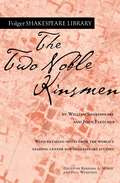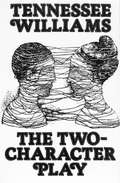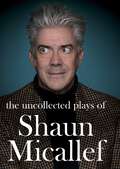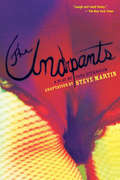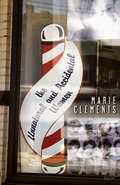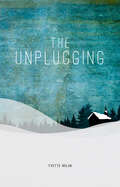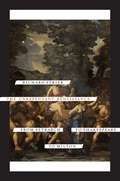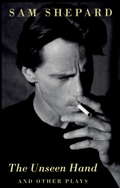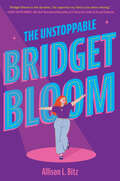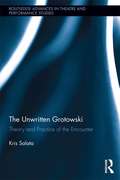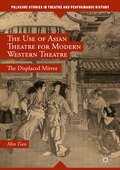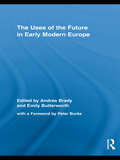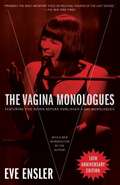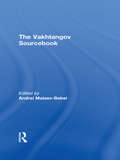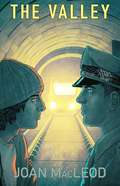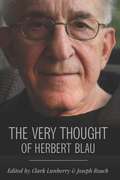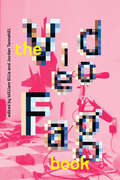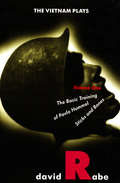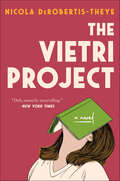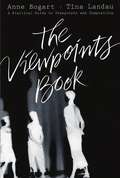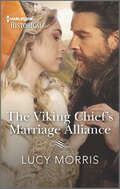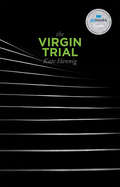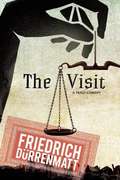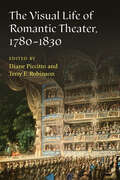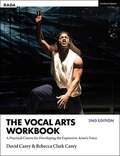- Table View
- List View
The Two Noble Kinsmen (Folger Shakespeare Library)
by William Shakespeare John FletcherThe authoritative edition of The Two Noble Kinsmen from The Folger Shakespeare Library, the trusted and widely used Shakespeare series for students and general readers.Written by Shakespeare and John Fletcher, this play tells the familiar story of a love triangle. Here, though, it seems distant and strange. Initially, the Theban knights Arcite and Palamon are devoted kinsmen, both serving their king, Creaon, who is defeated by Theseus, Duke of Athens. After they are imprisoned in Athens, they see Emilia, sister of the Duchess of Athens, through a window. They become rivals for her love, eager to fight each other to the death, even though she does not know they exist. After Arcite is released and banished, and Palamon escapes, they begin their would-be fight to the death with chivalric ceremony. Theseus, happening on them, decrees that they must compete for her in a tournament, after which the loser will be executed. Emilia is no willing bride; as a girl, she loved Flavina, who has died. Still, she tries to avert the tournament by choosing between Arcite and Palamon, only to find she cannot. The jailer&’s daughter, a character added by the playwrights, is infatuated with Palamon and helps him escape. But the social gulf between her and Palamon is unimaginably wide. Only the gods can bring the play to resolution. This edition includes: -Freshly edited text based on the best early printed version of the play -Full explanatory notes conveniently placed on pages facing the text of the play -Scene-by-scene plot summaries -A key to the play&’s famous lines and phrases -An introduction to reading Shakespeare&’s language -An essay by a leading Shakespeare scholar providing a modern perspective on the play -Fresh images from the Folger Shakespeare Library&’s vast holdings of rare books -An annotated guide to further reading Essay by Dieter Mehl The Folger Shakespeare Library in Washington, DC, is home to the world&’s largest collection of Shakespeare&’s printed works, and a magnet for Shakespeare scholars from around the globe. In addition to exhibitions open to the public throughout the year, the Folger offers a full calendar of performances and programs. For more information, visit Folger.edu.
The Two-Character Play
by Tennessee WilliamsA classic play by Tennessee Williams in a definitive, author-approved edition. Reality and fantasy are interwoven with terrifying power as two actors on tour--brother and sister--find themselves deserted by the trope in a decrepit "state theatre in an unknown state." Faced (perhaps) by an audience expecting a performance, they enact "The Two-Character Play"--an illusions within an illusion, and "out cry" from isolation, panic and fear. "I think it is my most beautiful play since Streetcar," Tennessee Williams said, "and I've never stopped working on it....It is a cri de coeur, but then all creative work,all life, in a sense is a cri de coeur." In the course of its evolution, several earlier versions of The Two-Character Play have been produced. The first of them was presented in 1967 in London and Chicago and brought out in 1969 by New Directions in a signed limited edition. The next, staged in 1973 in New York under the title Out Cry, was published by New Directions in 1973 The third version (New York, 1975), again titled The Two-Character Play, is the one Tennessee Williams wished to include in New Directions' The Theatre of Tennessee Williams series. It is this version which is presented in this ND paperback.
The Uncollected Plays of Shaun Micallef
by Shaun MicallefShaun Micallef is without doubt Australia's premier comedian, writer, producer, presenter, actor, author, broadcaster, bon vivant, gadfly, troubadour, dancer, impresario, acrobat, lion tamer, poet and elite sportsman. But did you know that he is also an internationally renowned playwright? No? Typical. It really is a stain on our national character that this doyen of theatre doesn't get the credit he deserves or attention he craves in this country - mute testimony to Australia's cultural cringe and inveterate idiocy. From Broadway to the West End, his name is mentioned in the same breath as Mamet and Ray Cooney; and in the salons of Paris Micallef is worshipped as a god. His plays, uncollected until now, are irrefutable proof that when it comes to listing the world's greatest dramatists, the name Micallef should be inserted in there somewhere. Even if you have never been to the theatre before, just holding this book in your hands as you are now will change your life forever. You'll laugh, you'll cry, your body will spasm convulsively and you may even be so moved that you will open the book and read it.
The Underpants: A Play by Carl Sternheim
by Steve MartinTheobald Maske has an unusual problem: his wife's underpants won't stay on. One Sunday morning they fall to her ankles right in the middle of town--a public scandal! Mortified, Theo swears to keep her at home until she can find some less unruly undies. Amid this chaos he's trying to rent a room in their flat. The prospective lodgers have some underlying surprises of their own. In The Underpants, Steve Martin brings his comic genius and sophisticated literary style to Carl Sternheim's classic 1910 farce, Die Hose. His hilarious new version was staged by Artistic Director Barry Edelstein, and opened in March '02 on Off-Broadway to critical acclaim.
The Unnatural and Accidental Women
by Marie ClementsSurrealist dramatization of a notorious case involving mysterious deaths on Vancouver's Skid Row. Cast of 11 women and 2 men.
The Unplugging
by Yvette NolanForced to rely upon traditional wisdom for their survival, Elena and Bern retreat from the remains of civilization to a freezing, desolate landscape where they attempt to continue their lives after the end of the world. When a charismatic stranger from the village arrives seeking their aid, the women must decide whether they will use their knowledge of the past to give the society that rejected them the chance at a future.
The Unrepentant Renaissance
by Richard StrierWho during the Renaissance could have dissented from the values of reason and restraint, patience and humility, rejection of the worldly and the physical? These widely articulated values were part of the inherited Christian tradition and were reinforced by key elements in the Renaissance, especially the revival of Stoicism and Platonism. This book is devoted to those who did dissent from them. Richard Strier reveals that many long-recognized major texts did question the most traditional values and uncovers a Renaissance far more bumptious and affirmative than much recent scholarship has allowed. The Unrepentant Renaissance counters the prevalent view of the period as dominated by the regulation of bodies and passions, aiming to reclaim the Renaissance as an era happily churning with surprising, worldly, and self-assertive energies. Reviving the perspective of Jacob Burckhardt and Nietzsche, Strier provides fresh and uninhibited readings of texts by Petrarch, More, Shakespeare, Ignatius Loyola, Montaigne, Descartes, and Milton. Strier's lively argument will stir debate throughout the field of Renaissance studies.
The Unseen Hand
by Sam ShepardThe complete scripts to six Sam Shepard plays: The Unseen Hand, Forensic and the Navigators, The Holy Ghostly, Back Bog Beast Bait, Shaved Splits, 4-H Club.
The Unstoppable Bridget Bloom
by Allison L. BitzA bright and fun fat-positive YA novel about learning how to express yourself when what has always defined you is no longer an option. Perfect for fans of Julie Murphy and Emma Lord.Bridget Bloom’s out-of-this-world voice is the perfect fit for center stage. When Bridget’s admitted to Richard James Academy, a college prep boarding school with a prestigious music program—where heartthrob Duke Ericson attends—all her dreams are on track to come true: leave the hometown where she’s never belonged, fall in love, and launch her Broadway career.But upon arriving at the academy, she learns that due to her low music theory scores, she’s not eligible to perform or earn the sponsorship she needs to afford the tuition. Worst of all, Dean of Students Octavia Lawless, the one person with the power to reverse the decision, challenges her to work on her humility . . . by not singing at all.Without her voice, Bridget will have to get out of her comfort zone and find a new way to shine. Good thing she is unstoppable!From debut author Allison L. Bitz comes a coming-of-age story of self-discovery, humility, friendship, and love. Includes sheet music for two original songs!
The Unwritten Grotowski: Theory and Practice of the Encounter (Routledge Advances in Theatre & Performance Studies)
by Kris SalataThis book gives a new view on the legacy of Jerzy Grotowski (1933-1999), one of the central, and yet misunderstood, figures who shaped 20th-century theatre, focusing on his least known last phase of work on ancient songs and the craft of the performer. Salata posits Grotowski’s work as philosophical practice, and more particularly, as practical research in the phenomenology of being, arguing that Grotowski’s departure from theatrical productions (and thus critical consideration) resulted from his uncompromising pursuit of one central problem, "What does it mean to reveal oneself?" — the very question that drove his stage directing work. The book demonstrates that the answer led him through the path of gradually stripping the theatrical phenomenon down to its most elemental aspect, which shows itself through the craft of the performer as a non-representational event. This particular quality released at the heights of the art of the performer is referred to as aliveness, or true liveness in this study in order to shift scholarly focus onto something that has always fascinated great theatre practitioners, including Stanislavski and Grotowski, and of which academic scholarship has limited grasp. Salata’s theoretical analysis of aliveness reaches out to phenomenology and a broad range of post-structural philosophy and critical theory, through which Grotowski’s project is portrayed as philosophical practice.
The Use of Asian Theatre for Modern Western Theatre: The Displaced Mirror (Palgrave Studies in Theatre and Performance History)
by Min TianThis book is a historical study of the use of Asian theatre for modern Western theatre as practiced by its founding fathers, including Aurélien Lugné-Poe, Adolphe Appia, Gordon Craig, W. B. Yeats, Jacques Copeau, Charles Dullin, Antonin Artaud, V. E. Meyerhold, Sergei Eisenstein, and Bertolt Brecht. It investigates the theories and practices of these leading figures in their transnational and cross-cultural relationship with Asian theatrical traditions and their interpretations and appropriations of the Asian traditions in their reactional struggles against the dominance of commercialism and naturalism. From the historical and aesthetic perspectives of traditional Asian theatres, it approaches this intercultural phenomenon as a (Euro)centred process of displacement of the aesthetically and culturally differentiated Asian theatrical traditions and of their historical differences and identities. Looking into the displaced and distorted mirror of Asian theatre, the founding fathers of modern Western theatre saw, in their imagination of the 'ghostly' Other, nothing but a (self-)reflection or, more precisely, a (self-)projection and emplacement, of their competing ideas and theories preconceived for the construction, and the future development, of modern Western theatre.
The Uses of the Future in Early Modern Europe (Routledge Studies in Renaissance Literature and Culture)
by Andrea Brady Emily ButterworthIs modernity synonymous with progress? Did the Renaissance really break with the cyclical, agrarian time of the Middle Ages, inaugurating a new concept of irreversible time in a secular culture defined by development? How does methodology affect scholarly responses to the idea of the future in the past? This collection of interdisciplinary essays from the fields of literary criticism, cultural studies, politics and intellectual history offers new answers to these commonplace questions. They explore elite and popular culture, women and men’s experiences, and the encounter between East and West, providing a comparative view on the range of personal, political and social practices with which early modern people planned for, imagined, manipulated or even rejected the future. Examining poetry, architecture, colonial exploration, technology, drama, satire, wills, childbirth and deathbed rituals, humanism, religious radicalism and republicanism, this collection provides new readings of canonical early modern texts and insights into popular culture. With a foreword by Peter Burke.
The Vagina Monologues (10th Anniversary Edition)
by Eve Ensler"I was worried about vaginas. I was worried about what we think about vaginas, and even more worried that we don't think about them... So I decided to talk to women about their vaginas, to do vagina interviews, which became vagina monologues. I talked with over two hundred women. I talked to old women, young women, married women, single women, lesbians, college professors, actors, corporate professionals, sex workers, African American women, Hispanic women, Asian American women, Native American women, Caucasian women, Jewish women. At first women were reluctant to talk. They were a little shy. But once they got going, you couldn't stop them." So begins Eve Ensler's hilarious, eye-opening tour into the last frontier, the forbidden zone at the heart of every woman. Adapted from the award-winning one-woman show that's rocked audiences around the world, this groundbreaking book gives voice to a chorus of lusty, outrageous, poignant, and thoroughly human stories, transforming the question mark hovering over the female anatomy into a permanent victory sign. With laughter and compassion, Ensler transports her audiences to a world we've never dared to know, guaranteeing that no one who reads The Vagina Monologues will ever look at a woman's body the same way again.
The Vakhtangov Sourcebook
by Andrei Malaev-Babel‘Scrupulously compiled and skillfully translated by Andrei Malaev-Babel, The Vakhtangov Sourcebook ... provides the most comprehensive addition to English readers’ knowledge of the philosophy, pedagogy, and legacy of Vakhtangov.’ – Modern Language Review 'An exceptionally valuable book that promises to be the definitive reference for Vakhtangov's work for years to come.' – Theatre Topics Yevgeny Vakhtangov was the creator of Fantastic Realism, credited with reconciling Meyerhold’s bold experiments with Stanislavski’s naturalist technique. The Vakhtangov Sourcebook compiles new translations of his key writings on the art of theatre, making it the primary source of first hand material on this master of theatre in the English speaking world. Vakhtangov’s essays and articles are accompanied by: Diary and Notebook excerpts His lectures to the Vakhtangov Studio In-depth accounts of Vakhtangov methods in rehearsal Production photographs and sketches Extensive bibliographies Director’s notes on key performances An extensive introductory overview from editor Andrei Malaev-Babel explains Vakhtangov‘s creative life, his groundbreaking theatrical concepts and influential directorial works.
The Valley
by Joan Macleod"MacLeod has a wonderful ear and eye for the everyday details."--Calgary HeraldInspired by the 2007 Tasering death of Robert Dziekanski at the Vancouver airport, The Valley dramatizes the volatile relationship between law enforcement and people in the grip of mental illness. The play connects both sides of this relationship by portraying two families embattled with depression, each guided by good intentions but challenged by their own flawed humanity.Joan MacLeod is the author of numerous award-winning plays. Her work has been translated into more than eight languages with productions throughout the world, including a sold-out run in New York.
The Very Thought of Herbert Blau
by Joseph Roach Clark LunberryHerbert Blau (1926–2013) was the most influential theater theorist, practitioner, and educator of his generation. He was the leading American interpreter of the works of Samuel Beckett and as a director was instrumental in introducing works of the European avant-garde to American audiences. He was also one of the most far-reaching and thoughtful American theorists of theater and performance, and author of influential books such as The Dubious Spectacle, The Audience, and Take Up the Bodies: Theater at the Vanishing Point. In The Very Thought of Herbert Blau, distinguished artists and scholars offer reflections on what made Blau's contributions so visionary, transformative, and unforgettable, and why his ideas endure in both seminar rooms and studios. The contributors, including Lee Breuer, Sue-Ellen Case, Gautam Dasgupta, Elin Diamond, S. E. Gontarski, Linda Gregerson, Martin Harries, Bill Irwin, Julia Jarcho, Anthony Kubiak, Daniel Listoe, Clark Lunberry, Bonnie Marranca, Peggy Phelan, Joseph Roach, Richard Schechner, Morton Subotnick, Julie Taymor, and Gregory Whitehead, respond to Blau's fierce and polymorphous intellect, his relentless drive and determination, and his audacity, his authority, to think, as he frequently insisted, "at the very nerve ends of thought."
The Videofag Book
by William Ellis Jordan TannahillLonglisted for the 2018 Toronto Book AwardsIn October 2012, lovers William Ellis and Jordan Tannahill moved into a former barbershop in Toronto's Kensington Market neighbourhood and turned it into an art space called Videofag. Over the next four years Videofag became a hub for counterculture in the city, playing host to a litany of performances, screenings, parties, exhibitions, and all manner of queer fuckery. But hosting a city in their house took its toll and eventually William and Jordan broke up, closing the space for good in June 2016.The Videofag Book is a chronicle of those four years told through multiple voices and mediums: a personal history by William and Jordan; a love letter by Jon Davies; a communal oral history compiled by Chandler Levack; a play by Greg MacArthur; a poem by Aisha Sasha John; a chronological history of Videofag's programming; and a photo archive curated by William and Jordan in full colour.
The Vietnam Plays: The Basic Training of Pavlo Hummel and Sticks and Bones (Books That Changed the World)
by David Rabe&“The only Vietnam plays to appear on Broadway while the war was raging&” from the Tony Award–winning playwright of Hurlyburly (Observer). David Rabe has been a major voice and crucial force in American drama since 1971 when, in the midst of the Vietnam War, he startled the nation with The Basic Training of Pavlo Hummel. The story of a native recruit&’s initiation into war, it is by turns brutal and hilarious. It won the young playwright an Obie and was hailed by The New York Times as &“rich humor, irony, and insight.&” More than four decades later, Rabe continues to be one of our most compelling dramatists. In this, the first of two volumes of The Vietnam Plays, Pavlo Hummel is paired with the equally intense Sticks and Bones, in which a blinded Vietnam veteran returns home numbed by the war and is astonished by his family&’s inability to comprehend their country&’s politics and his rage. &“Pavlo won Al Pacino a Tony, and Sticks and Bones won one for its Harriet, Elizabeth Wilson—plus a nomination for its Oz, Tom Aldredge. It also won the Best Play Tony&” (Observer). &“Defies a million slogans to become a contemporary masterpiece.&” —The Harvard Crimson on The Basic Training of Pavlo Hummel &“Sticks and Bones is still a searing critique of America&’s willful ignorance in the face of an ultra-violent international war machine operating in our name.&” —TheaterMania &“This scalding work scores direct hits on the stubborn obliviousness of the folks back home to the realities of that dirtiest of 20th century wars.&” —The Hollywood Reporter on Sticks and Bones
The Vietri Project: A Novel
by Nicola DeRobertis-TheyeA Lithub, Good Reads, Bustle, and The Millions Most Anticipated Book of 2021"The Vietri Project is a riveting, shifting quest, an evocative trip to Rome, and a beautiful portrayal of the ways you need to return to the past in order to move forward. A great delight from start to finish.”--Lily King, New York Times bestselling author of Writers and LoversA search for a mysterious customer in Rome leads a young bookseller to confront the complicated history of her family, and that of Italy itself, in this achingly intimate debut with echoes of Lily King and Elif Batuman.Working at a bookstore in Berkeley in the years after college, Gabriele becomes intrigued by the orders of signor Vietri, a customer from Rome whose numerous purchases grow increasingly mystical and esoteric. Restless and uncertain of her future, Gabriele quits her job and, landing in Rome, decides to look up Vietri. Unable to locate him, she begins a quest to unearth the well-concealed facts of his life.Following a trail of obituaries and military records, a memoir of life in a village forgotten by modernity, and the court records of a communist murder trial, Gabriele meets an eclectic assortment of the city’s inhabitants, from the widow of an Italian prisoner of war to members of a generation set adrift by the financial crisis. Each encounter draws her unexpectedly closer to her own painful past and complicated family history—an Italian mother diagnosed with schizophrenia and institutionalized during her childhood, and an extended family in Rome still recovering from the losses and betrayals in their past. Through these voices and histories, Gabriele will discover what it means to be a person in the world; a member of a family and a citizen of a country—and how reconciling these stories may be the key to understanding her own.
The Viewpoints Book
by Tina Landau Anne BogartThe Viewpoints is a technique of improvisation that grew out of the postmodern dance world. It was first articulated by choreographer Mary Overlie, who broke down the two dominant issues performers deal with--space and time--into six categories. Since that time, directors Anne Bogart and Tina Landau have expanded her notions and adapted them for actors to function together spontaneously and intuitively and to generate bold, theatrical work.The Viewpoints are a set of names given to certain principles of movement through time and space--they constitute a language for talking about what happens on stage. Coupling this with Composition, which is the practice of selecting and arranging the separate components of theatrical language into a cohesive work of art, provides theatre artists with an important new tool for creating and understanding their art form.Primarily intended for the many theatre artists who, in the last several years, have become intrigued with Viewpoints yet have had no single source to refer to in their investigations. It can also be used by anyone with a general interest in collaboration and the creative process, whether in art, business or daily life.Anne Bogart is Artistic Director of the SITI Company, which she founded with Japanese director Tadashi Suzuki in 1992. She is the recipient of two OBIE Awards and a Bessie Award, and is an associate professor at Columbia University. Her recent works include Alice's Adventures; Bobrauschenbergamerica; Small Lives, Big Dreams; Marathon Dancing; and The Baltimore Waltz.Tina Landau, noted director and playwright, whose original work includes Space (Time magazine 10 Best), Dream True (with composer Ricky Ian Gordon) and Floyd Collins (with composer Adam Guettel), which received the Lucille Lortel Award for Best Musical, an OBIE Award and seven Drama Desk nominations. She has been an ensemble member of the Steppenwolf Theatre Company since 1997.
The Viking Chief's Marriage Alliance: A dramatic and emotional Viking debut
by Lucy MorrisA challenging wifeFor a warrior Viking When Thorstein Bergson rescues a beautiful woman from a storm-tossed longship, he little expects to broker a powerful marriage alliance with her. This high-status ice queen is not the comfortable wife the warrior chief is seeking. But maybe the bittersweet pain in Gyda&’s eyes hides another woman beneath? The one he tasted that first night when she&’d kissed him with such pent-up longing…?From Harlequin Historical: Your romantic escape to the past.
The Virgin Trial
by Kate HennigFifteen-year-old Bess has no idea when she heads to London to see her Uncle Ted that she is about to find herself at the heart of a scandal involving sexual impropriety; her stepfather, Thom; and an attempted overthrow of the government. What does all this have to do with her? How adroitly can Bess manoeuvre through a series of interviews to avoid being swept up in the peril that might ensue? And will she be able to spin the facts to create a myth based on her own innocence?
The Visit: A Tragicomedy
by Friedrich DurrenmattFriedrich Dürrenmatt is considered one of the most significant playwrights of our time. During the years of the Cold War, arguably only Beckett, Camus, Sartre, and Brecht rivaled him as a presence in European letters. In this ALTA National Translation Award–winning new translation of what many critics consider his finest play, Joel Agee gives a fresh lease to a classic of twentieth-century theater. Dürrenmatt once wrote of himself: “I can best be understood if one grasps grotesqueness,” and The Visit is a consummate, alarming Dürrenmatt blend of hilarity, horror, and vertigo. The play takes place “somewhere in Central Europe” and tells of an elderly millionairess who, merely on the promise of her millions, swiftly turns a depressed area into a boom town. But the condition attached to her largesse, which the locals learn of only after they are enmeshed, is murder. Dürrenmatt has fashioned a macabre and entertaining parable that is a scathing indictment of the power of greed and confronts the perennial questions of honor, loyalty, and community.
The Visual Life of Romantic Theater, 1780-1830
by Diane Piccitto Terry F. RobinsonThe Visual Life of Romantic Theater examines the dynamism and vibrancy of stage spectacle and its impact in an era of momentous social upheaval and aesthetic change. Situating theatrical production as key to understanding visuality ca. 1780-1830, this book places the stage front and center in Romantic scholarship by re-envisioning traditional approaches to artistic and social creation in the period. How, it asks, did dramaturgy and stagecraft influence aesthetic and sociopolitical concerns? How does a focus on visuality expand our understanding of the historical experience of theatergoing? In what ways did stage performance converge with visual culture beyond the theater? How did extratheatrical genres engage with theatrical sight and spectacle? Finally, how does a focus on dramatic vision change the way we conceive of Romanticism itself? The volume’s essays by emerging and established scholars provide exciting and suggestive answers to these questions, along with a more capacious conception of Romantic theater as a locus of visual culture that reached well beyond playhouse walls.
The Vocal Arts Workbook: A Practical Course For Developing The Expressive Actor's Voice (Rada Guides)
by David Carey Rebecca Clark Carey"Refreshing and imaginative, this book teaches through enhanced awareness and instructs through clear and specific exercises." Cicely Berry A practical course for actors and other professional voice-users to achieve clarity and expressivity with the voice. Setting out the fundamental principles of voice training, the book provides structured and informed methods for developing vocal power, range and flexibility. At the heart of the book are practical projects with exercises which enable you to: - connect your breath with your voice - meet the demands of your performance - use your voice expressively through fully controlling pitch and range Each chapter consists of an introductory framework; explorations; exercises; follow-up work; suggested texts and further reading altogether offering a unique, student-centred approach not found in other voice books. This revised edition speaks more directly to the actor, rather than the voice teacher, through revised terminology and descriptions, updated references, additional appendices on health and other issues related to trends in contemporary drama and questions of equality, diversity and inclusion with respect to vocabulary and suggested texts. Includes forewords by Cicely Berry and Fiona Shaw.
